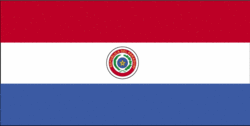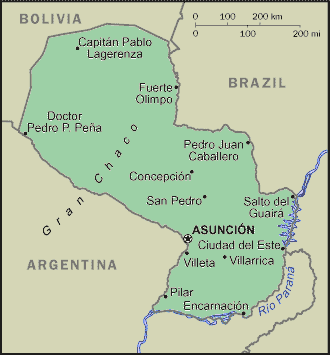Traveling Luck for Paraguay. Paraguay, South America
Paraguay is located in Central South America, northeast of Argentina.
Land in Paraguay is grassy plains and wooded hills east of Rio Paraguay; Gran Chaco region west of Rio Paraguay mostly low, marshy plain near the river, and dry forest and thorny scrub elsewhere.
Paraguayan land covers an area of 406750 square kilometers which is slightly smaller than California
Paraguay has borders with Argentina for 1880km, Bolivia for 750km and Brazil for 1290km.
 Paraguayan national flag (Flag of Paraguay)
Paraguayan national flag (Flag of Paraguay)
As for the Paraguayan climate; subtropical to temperate; substantial rainfall in the eastern portions, becoming semiarid in the far west.
Paraguayan(s) speak Spanish (official), Guarani (official).
Places of note in Paraguay
- Asunción
- San Lorenzo
- Capiatá
- Lambaré
- Fernando de la Mora
- Limpio
- Nemby
- Encarnación
- Colonia Mariano Roque Alonso
- Itauguá
- Villa Elisa
- San Antonio
- Caaguazú
- Presidente Franco
- Coronel Oviedo
- Concepción
- Villarrica
- Caacupé
- Itá
- Ayolas
- Santa Rita
- Colonia General Alfredo Stroessner
- Areguá
- San Isidro de Curuguaty
- Horqueta
- Piribebuy
- Paraguarí
- Tobatí
- Ypacarai
- San Pedro de Ycuamandiyú
- Capitán Bado
- Guarambaré
- Eusebio Ayala
- Filadelfia
- San Juan Nepomuceno
 Paraguayan map
Paraguayan map
Regions of Paraguay
In the disastrous War of the Triple Alliance (1865-70), Paraguay lost two-thirds of all adult males and much of its territory. It stagnated economically for the next half century. In the Chaco War of 1932-35, large, economically important areas were won from Bolivia. The 35-year military dictatorship of Alfredo STROESSNER was overthrown in 1989, and, despite a marked increase in political infighting in recent years, relatively free and regular presidential elections have been held since then.
Landlocked Paraguay has a market economy marked by a large informal sector. This sector features both reexport of imported consumer goods to neighboring countries, as well as the activities of thousands of microenterprises and urban street vendors. Because of the importance of the informal sector, accurate economic measures are difficult to obtain. A large percentage of the population derives its living from agricultural activity, often on a subsistence basis. The formal economy grew by an average of about 3% annually in 1995-97, but averaged near-zero growth in 1998-2001 and contracted by 2.3 percent in 2002, in response to regional contagion and an outbreak of hoof-and-mouth disease. On a per capita basis, real income has stagnated at 1980 levels. Most observers attribute Paraguay's poor economic performance to political uncertainty, corruption, lack of progress on structural reform, substantial internal and external debt, and deficient infrastructure. Aided by a firmer exchange rate and perhaps a greater confidence in the economic policy of the DUARTE FRUTOS administration, the economy rebounded between 2003 and 2005, posting modest growth each year.
Paraguayan natural resources include hydropower, timber, iron ore, manganese, limestone
landlocked; lies between Argentina, Bolivia, and Brazil; population concentrated in southern part of country
Paraguayan religion is Roman Catholic 90%, Mennonite and other Protestant 10%.
Natural hazards in Paraguay include local flooding in southeast (early September to June); poorly drained plains may become boggy (early October to June).
Travel Advice for Paraguay
ParaguaySUMMARY
- The British Embassy in Paraguay closed to the public on Friday 29 April 2005. Any enquiries should now be directed to the British Embassy in Buenos Aires. For emergency consular assistance only, please contact the Honorary Consul in Asunción. Contact details are given below.
- The threat from terrorism is low. But you should be aware of the global risk of indiscriminate terrorist attacks which could be against civilian targets, including places frequented by foreigners.
- During December 2006, there have been demonstrations in the downtown area of Asunción. Protests area likely to continue and could lead to localised violence. You should avoid large public gatherings.
- There have been increased reports of dengue fever, including in the capital, Asunción. You area advised to minimise exposure to mosquito bites by covering up and using repellents.
- Passports must be stamped on entry.
- Around 250 British tourists visit Paraguay every year. Most visits are trouble free. Only two British nationals have required consular assistance in Paraguay in 2006. However, you should be aware that violent crime is increasing, so you need to be on your guard and exercise caution at all times, particularly in cities at night.
- We strongly recommend that you obtain comprehensive travel and medical insurance before travelling. You should check any exclusions, and that your policy covers you for the activities you want to undertake. Please see: Travel Insurance.
SAFETY AND SECURITY
LOCAL LAWS AND CUSTOMS
There are severe penalties for drug trafficking. Prison sentences in such cases are mandatory, without bail, and prisons standards are poor.
Paraguay is an isolated, landlocked country that has few of the normal facilities for tourists outside the main towns. It is also a country that is finding its way after many decades of dictatorship. You should therefore be realistic about the standards of service and facilities that you can expect to find.
Homosexuality is accepted, but Paraguay is also a conservative society. You are therefore advised to show respect for local customs.
ENTRY REQUIREMENTS
If you are under 18, travelling across borders in the region without one or both parents, it is advisable to have written permission to travel from both parents. Single parents or other adults travelling alone with children should be aware that immigration officers often request documentary evidence of parental responsibility before allowing lone parents to enter the country or, in some cases, before permitting the children to leave the country.
If you wish to stay longer than three months as a visitor you must produce a "certificado de buena conducta" (certificate of good conduct) in order to apply for a residence permit. You should obtain this certificate from your local police station in the UK before travelling, as the Honorary Consul cannot issue one. This must be issued in the month before you leave the UK and has limited validity of six months.
If you intend to stay in Paraguay for longer than three months (e.g set up a business, work or study) you should contact the Paraguayan Embassy in London: Paraguayan Representation in the UK.
They can provide further assistance before travelling in order to make sure you get the necessary entry clearance documentation. It can be a lengthy process to regularise your status in country if you arrive in Paraguay without the required documentation.
HEALTH
There are occasional reports of outbreaks of malaria and dengue fever. Reports of leishmaniasis (transmitted by insects) have also risen in recent years. More than three-quarters of British travellers who contracted malaria in 2005 did not take preventive measures, such as malaria prevention tablets. However, malaria can occur despite appropriate prevention, and therefore you should promptly seek medical care in the event of a fever or flu-like illness in country or in the first year following your return from travelling to a malaria risk country. Before travelling you should seek medical advice about the malaria risk in Paraguay. .
You should seek medical advice before travelling and ensure that all appropriate vaccinations are up to date. For further information on health, check the Department of Health’s website at www.dh.gov.uk.
GENERAL
The British Embassy in Asunción closed to the public on Friday 29 April 2005. The British Embassy in Buenos Aires now has overall responsibility for Paraguay and all enquiries should be directed to them at the contact details given below. For emergency consular assistance only, please contact the British Honorary Consul in Asunción: Dr Guillermo F Peroni; Address: Eulogio Estigarribia, 4846 C/Monseñor Bogarin, Asunción, Paraguay; Telephone: (595) (21) 210405; Facsimile: (595) (21) 600448; Email:guillermo.peroni@pstbn.com.py /bettina.albertini@pstbn.com.py.
ATMs are widespread, many accepting Cirrus, Maestro &Visa cards. Credit & Debit cards can be used widely in shops, supermarkets etc, as long as proof of ID is provided i.e. passport. Travellers cheques are not widely used. When exchanging money, you should use registered bureaux de change. We strongly advise that you do not change money with people offering attractive rates on the street or on arrival at the airport, as false banknotes are common.
OTHER

 Search
Search Paraguay country profile
Paraguay country profile Travel advice for Paraguay
Travel advice for Paraguay